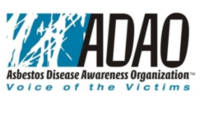 A measure currently being considered by lawmakers is coming under fire by occupational safety and health advocates who say that it would delay compensation for people suffering from mesothelioma and require victims to disclose personal information – such as social security numbers – thus making them vulnerable to identify theft.
A measure currently being considered by lawmakers is coming under fire by occupational safety and health advocates who say that it would delay compensation for people suffering from mesothelioma and require victims to disclose personal information – such as social security numbers – thus making them vulnerable to identify theft.
The Furthering Asbestos Claim Transparency Act (FACT Act) (H.R. 526), which is expected to pass easily in the U.S. House of Representatives, would require asbestos bankruptcy trusts to respond to any and all corporate defendants’ information requests, which would slow -- or effectively stop – compensation for victims of asbestos-related diseases.
A short lifespan
“Since patients diagnosed with fatal asbestos-caused diseases have very short expected lifespans, a delay in justice could leave victims’ next of kin struggling to pay medical and funeral bills,” said Susan Harley of Public Citizen.
“The real need for transparency is disclosure of past and ongoing asbestos exposures,” said Harley. “Congress should act to protect asbestos victims instead of opening the door for the asbestos industry to further escape accountability for poisoning the public and exposing trust claimants to scams.”
About the bill
The bill was introduced by Rep. Farenthold, Blake [R-TX-27]. A summary from www.Congress.gov reads:
Furthering Asbestos Claim Transparency (FACT) Act of 2013 - Amends federal bankruptcy law concerning a trust formed under a reorganization plan following the discharge in bankruptcy of a debtor corporation in order to assume the debtor's liability with respect to claims seeking recovery for personal injury, wrongful death, or property damage allegedly caused by the presence of, or exposure to, asbestos or asbestos-containing products.
Requires such a trust to file with the bankruptcy court quarterly reports, available on the public docket, which describe each demand the trust has received from a claimant and the basis for any payment made to that claimant (excluding any confidential medical record or the claimant's full Social Security number).
Requires such reports, upon written request, and subject to payment (demanded at the option of the trust) for any reasonable cost incurred by it, to provide any information related to payment from, and demands for payment from, the trust to any party to any action in law or equity concerning liability for asbestos exposure.
"Under the guise of transparency"
The Asbestos Cancer Victims Rights Campaign (ACVRC) says the FACT Act is spearheaded by the American Legislative Exchange Council (ALEC) and the U.S. Chamber of Commerce and would significantly harm asbestos victims.
According to the group’s website, “The legislation is designed to make it more difficult for asbestos victims, including those with Mesothelioma and other cancers, to receive compensation for their injuries through asbestos trusts and the court system. As it stands, asbestos victims rarely receive anything close to adequate compensation. The goal of the FACT Act, under the guise of transparency, is designed to reduce this compensation even more.”
ACVRC is conducting an online petition drive to oppose the FACT Act.
Questionable claims
The Chamber says the FACT Act will deter fraudulent claims without impacting legitimate asbestos victims’ rights.
The Chamber’s Lisa A. Rickard said; “We are encouraged by the increasing scrutiny of these trusts and are hopeful that Congress will act to ensure that the trust system is working as intended. Questionable claims have been identified in the course of litigation that raise serious questions about asbestos trusts’ susceptibility to fraud and abuse.”
Before being recognized as a carcinogen, asbestos was widely used as insulation and a flame retardant in buildings, homes and workplaces like naval vessels. The Centers for Disease Control and Prevention (CDC) reports that roughly 3,000 people continue to die from mesothelioma and asbestosis every year. Some experts estimate the death toll is as high as 10,000 people per year when other types of asbestos-linked diseases and cancers are included.









